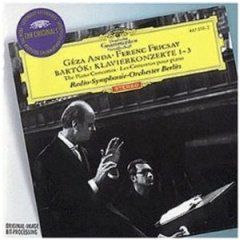Bela Bartok - Piano Concertos Nos. 1- 3
Bela Bartok - Piano Concertos Nos. 1-3

Piano Concerto No.1, BB 91, Sz. 83 1) 1. Allegro moderato - Allegro [8:47] 2) 2. Andante [7:51] 3) Allegro - 3. Allegro molto [6:36] Piano Concerto No.2, BB 101, Sz. 95 4) 1. Allegro [9:24] 5) 2. Adagio - Più adagio - Presto [11:26] 6) 3. Allegro molto [6:13] Piano Concerto No.3, BB 127, Sz. 119 7) 1. Allegretto [7:33] 8) 2. Adagio religioso [11:08] 9) 3. Allegro vivace [7:05] Géza Anda – piano Berlin Radio Symphony Orchestra Ferenc Fricsay - conductor
This classic set of Bartok's three piano concertos is also available in Anda's volume of "Great Pianists" on Philips, but I think this DG transfer is slightly superior. The recorded sound favors the piano somewhat over the orchestra - I could wish for a little closer orchestral perspective - but overall the sound here is excellent. Here are a few notes on both the music and the performances:
#1. Composed in 1926, this concerto is a muscular and rather dissonant work. The second mvt. Andante is a spooky dialogue between piano and percussion that seems to be a precursor to Bartok's chamber masterpiece: the Sonata for 2 Pianos and Percussion. This performance is one of the two finest I have heard; the other was on Bartok LP 313 (the label of Bartok's son Peter, a gifted recording engineer), with pianist Leonid Hambro and the Zimbler Sinfonietta conducted by Robert Mann (better known as the 1st violinist of the Juilliard Quartet, which left stunning recordings of the Six String Quartets). The mono sound on that disc (now available on CD) is close-up and clear as a bell, with a 2nd mvt. that is downright frightening in its primitive, wailing loneliness.
#2. Completed in 1931, this concerto strikes me as the finest of the three - it's far more contrapuntal and surely the hardest to play. In the 1st mvt., the piano takes charge from the beginning and plays almost continuously, while the strings are rather oddly silent throughout. Anda here is incredibly bold and extroverted - he obviously had technique to burn! The eerie 2nd mvt opening in the strings will sound familiar to anyone who has savored TV sci-fi of the 1960's: a very similar passage was employed by Dominic Frontiere in his music for "The Outer Limits." This mvt. is half Adagio and half Scherzo, and again the piano predominates. The Finale is an elaborate rondo which cleverly transforms the thematic/rhythmic elements heard in the 1st mvt.
Anda and Fricsay are wonderfully in sync throughout. Another stunning account of this work is the "live" 1969 concert reading by Claude Helffer, with Ernest Bour leading the Orchestre National de France on deleted INA Vogue 672006. That's a CD worth seeking out: I think its 2nd mvt. is a bit more compelling than Anda/Fricsay's. It is coupled with a really extraordinary live 1950 account of the Viola Concerto by William Primrose (for whom it was written), and the most savagely dramatic "Miraculous Mandarin" I have ever heard. And perhaps DG Westminster will get around to a CD re-issue of the c.1953 recording of Concertos 2 & 3 with Hungarian Edith Farnadi (daintier and more pointillistic than Anda), with remarkable conducting by Hermann Scherchen (his very slow introduction in the 2nd mvt. is disquietingly eerie). I have not heard the Sviatoslav Richter/Lorin Maazel account (EMI) - it is said to be superb.
#3. This is the only piano concerto that was not commissioned. The sick and impoverished Bartok wanted to give his wife Ditta a work with exclusive performance rights attached so as to insure her financial future. All but 18 bars of the concerto's orchestration was completed when Bartok was rushed to the hospital on 22 Sept. 1945 - he died there 4 days later. His protege Tibor Serly completed it (as he also did with the Viola Concerto). This is a gorgeous piece of music - it is Bartok's most romantic and meditative concerto. There is a subtle interplay of folk tune elements, and the slow mvt. Adagio Religioso seems like a humble prayer (almost Coplandesque in its simple, valedictory quality), with the usual demons almost at bay.
Anda and Fricsay give a performance that is both virile and sensitive; in many respects, it contains this set's finest moments. Fricsay constantly dmonstrates what an insightful and authoritative Bartok interpreter he was - if you haven't heard his Concerto for Orchestra or MSPC (both on DG), you are missing some terrific music making. Although only in mono, those recordings are among the finest ever, along with Reiner in the former and Mravinsky and Reiner in the latter.
For collectors, there is also a very interesting #3 on Dante CD 158, which features a c.1948 recording by Tatiana Nikolaieva with the USSR Radio under Nikolai Anosov (who, incidentally, was father of conductor Gennady Rozhdestvensky). It's in pretty good sound given the source and has some fine pianism and very plangent wind playing. It is coupled with an uncut version of Tchaikovsky's 2nd Piano Concerto (my favorite reading).
To sum it up: this DG set is a superb testimonial to two great Hungarian artists who shared a love of Bartok's music (they performed the 2nd piano concerto together some 60 times in concert prior to making this recording). What a tragedy that both of them were so short-lived: Fricsay died of cancer at 48 and Anda passed away at age 54. --- Jeffrey Lipscomb (Sacramento, CA United States)
download: uploaded anonfiles mega 4shared mixturecloud yandex mediafire ziddu
Last Updated (Monday, 19 August 2013 21:36)








